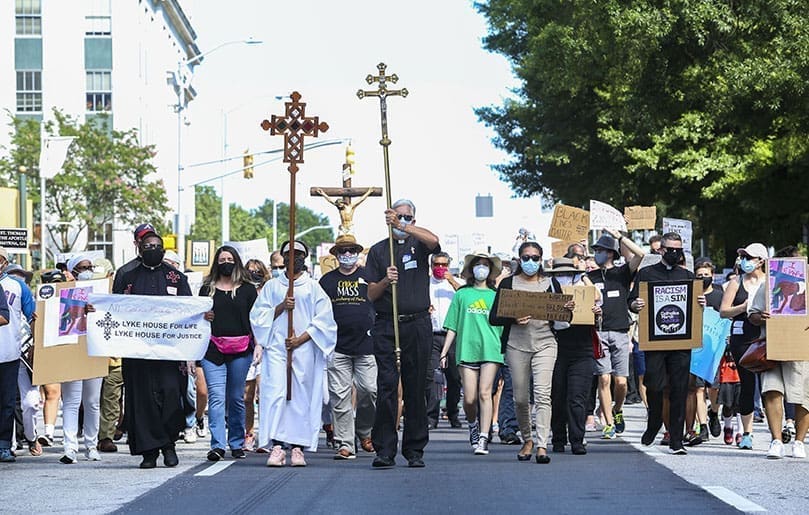 Photo By Michael Alexander
Photo By Michael AlexanderAtlanta
Atlanta priests, bishops take part in racial healing program
By ANDREW NELSON, Staff Writer | Published March 4, 2021
ATLANTA—A Catholic panel examining how to respond to racism in the church said healing will take place once women and men burdened by it are listened to and placed in the center of the conversation.
Restoring the community requires first seeing the damage caused by racist actions to a person, while dismissing the hurt adds additional harm.
The “Pastoral Strategies for Racial Healing in Our Communities” program brought together some 50 priests and bishops for an online presentation on Feb. 15. It was organized by the archdiocesan offices of Life, Dignity and Justice, along with Intercultural Ministries and Priest Personnel.
In the United States, some 6% of Black Americans are Catholic, according to a recent survey by the Pew Research Center. Majorities of Black Catholics in the national survey say their congregations and religious leaders are multiracial.
There are five predominantly Black Catholic parishes in the Archdiocese of Atlanta. They are St. Paul of the Cross Church, Atlanta; St. Anthony of Padua Church, Atlanta; Blessed Sacrament Church, Atlanta; Our Lady of Lourdes Church, Atlanta, and Sts. Peter and Paul Church, Decatur.
Deeper consequences
Panelists said avoiding challenging conversations like race relations does not promote healing, as problems fester with deeper consequences.
Panel member and high school chaplain, Father Rey Pineda has seen the effects of avoiding conversations.
“There’s a lot more that we should be doing to make sure the dignity of all people is upheld,” said the priest.
As chaplain at the archdiocesan St. Pius X High School, he saw the aftermath of a mock presidential debate in 2016 and its impact on school culture. Students divided themselves into groups throwing around political slogans and hurtful words, including comments about race, he said. The priest joined the school staff in 2018.
Despite well-intentioned pleas for unity from school leaders, Father Pineda said, the community suffered.
“There were deep wounds that had been inflicted upon the students by each other and even by the way that it was handled,” he said.
The church learned through the sex abuse crisis to put abuse victims at the center of the conversation. It can be the model for targeting racism too, he said.
The conversations may be uncomfortable for people. The cost of not facing it is steeper.
The high school now has parent, faculty and student groups focused on diversity topics and improved dialogue. Father Pineda noted that during the most recent election cycle, any problems were addressed with greater intentionality.
The school’s teachers have gone through training, and last month students presented a powerful Black History Month assembly, said the chaplain.
“All of that started with listening,” said Father Pineda.
Msgr. Edward Branch, a retired Atlanta priest, also served on the program panel. He said part of the challenge is seminary training teaches clergy to avoid unpleasantness in communal settings. Better not to rock the boat is the idea conveyed, Msgr. Branch said.
“It is costly, it is costing us dearly. Our silence for the sake of peace is costing our spiritual health,” he said.
Believers need to be encouraged to live as disciples of Christ and move beyond celebrating diversity as the only milestone, he said. Msgr. Branch encouraged his fellow priests to dig into contemporary writers of the Black experience as preparation in addressing their communities.
Priests in the pulpit need to uphold a church on the move “towards social transformation” because stopping at “warm fuzzy feelings” with anecdotes about people of different cultural and ethnic backgrounds getting along is “like feeding children candy; satisfying, but not nourishment,” he said.
And in the recent national survey, Black Catholics say they value hearing and having these conversations, tackling sensitive topics.
The Pew survey reported most Black Catholics believe it essential or important to hear homilies about political topics at their house of worship such as on immigration and race relations.
Four of 10 Black Catholics polled say they heard a homily about race relations; almost as many had heard a homily focused on abortion.
This is an opportunity to “transform our spirituality,” said the monsignor. “It takes a good deal of work and we have to be ready to patiently keep talking and keep saying this, while people have that sink in,” he said.
Carry forth the message
A third panelist, Danielle Brown, said living with the Christian faith should draw people to encounter people different from themselves as a step toward repairing damage caused by racism. She is associate director at the U.S. Conference of Catholic Bishops Ad Hoc Committee Against Racism, which issued “Open Wide Our Hearts,” a pastoral letter on this “persistent form of evil.”
Believers should “endeavor to be missionary disciples, carrying forth the message of fraternal charity and human dignity,” she said.
“Open Wide Our Hearts” confronts racism by asking people to be reflective and spend time “listening to the experience of those who have been affected by racism and developing and supporting programs that help repair the damages caused by racial discrimination,” she said.
“You’re a Christian first and that needs to be our paradigm, not racist or anti-racist,” Brown said. “It’s Christian and following Christ, or not.”
In closing remarks, Atlanta Archbishop Gregory J. Hartmayer, OFM Conv., said he is making it a priority to send future students to seminaries with robust multicultural programs to study for the priesthood. Drawing on his experience as a pastor, the archbishop said the church can serve as a place of hospitality, “opening the doors and welcoming everyone.”
Start celebrating everybody’s diversity, then you can celebrate, not just the Mass, but the social gatherings after Mass which reflect people from all over the world, he said.
“We should identify and celebrate the differences and the unique contribution each parishioner brings to the community of the church. We are all made in God’s image,” said the archbishop.